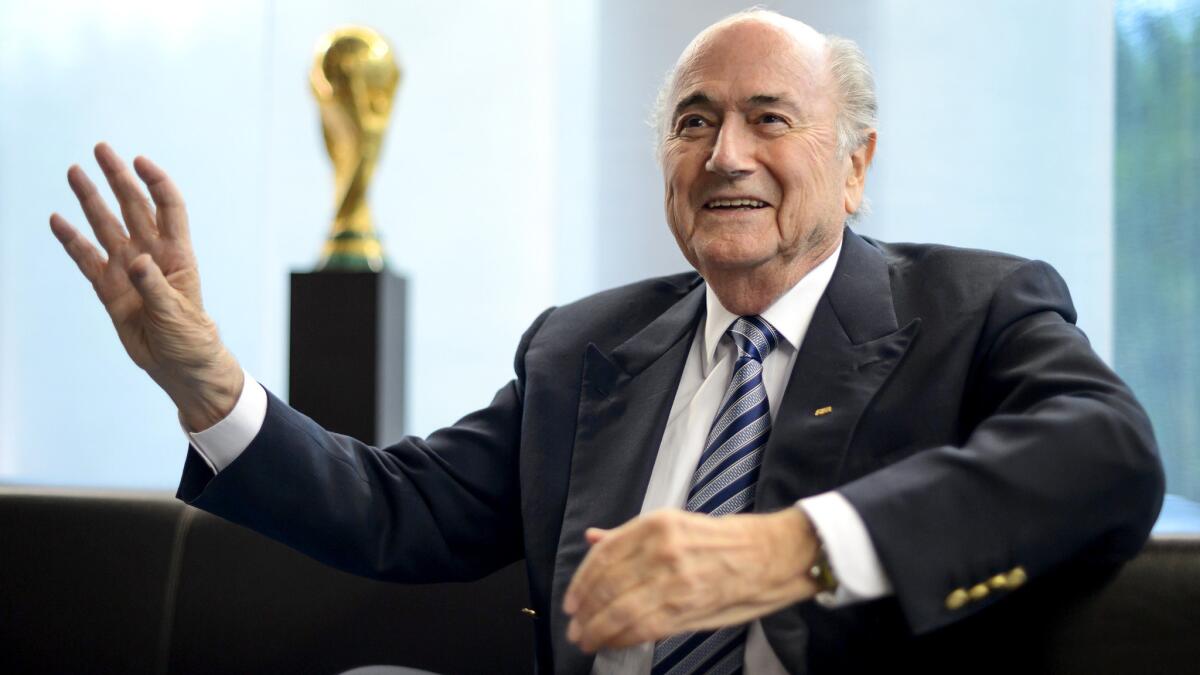FIFA’s troubles during Sepp Blatter’s tenure

- Share via
FIFA has been routinely called “scandal-plagued” for much of Sepp Blatter’s 17-year presidential reign.
Ahead of Blatter’s bid for a fifth term on Friday, here are some of the ways soccer’s governing body has earned its reputation:
1998 ELECTION
A key turning point to understanding FIFA’s modern history and Qatar’s influence. After 24 years of Joao Havelange’s presidency, FIFA member federations had a clear choice in choosing his successor. Sepp Blatter was Havelange’s longtime top administrator, who intimately knew FIFA’s culture. He had Havelange’s support and use of an airplane from the then-emir of Qatar, according to author David Yallop’s 1999 book “How They Stole the Game.” Lennart Johansson, a FIFA vice president from Sweden, promised financial transparency. He was backed by Europe and Africa and seemed likely to get more votes. Mohamed bin Hammam of Qatar was then a FIFA executive committee member and key campaigner for Blatter. Before the vote in Paris, intense late lobbying in hotels included widely reported offers of $50,000 to African delegates. Blatter won, 111-80, enough for Johansson to concede defeat before a second-round runoff. At his victory news conference, Blatter dismissed questions of corruption, though he has since referred to reported vote-buying at the Meridien Montparnasse hotel. “I will maintain that I was not there so it couldn’t be me,” Blatter said during his 2011 election contest — against Bin Hammam.
QATAR QUESTION
The FIFA executive committee’s choice of Qatar as 2022 World Cup host was the explosive event of Blatter’s third term and dominated his fourth. Cases of alleged unethical behavior by some voters are still open. Few think Blatter voted for Qatar, whose victory raised Bin Hammam’s status six months before the 2011 FIFA presidential election. Still, Blatter’s reputation suffered. The 2018-2022 bidding contests showed a culture of entitlement and disregard for rules by some executive committee members, which had festered on Blatter’s watch. An undercover sting by British newspaper the Sunday Times revealed the corruption that defined the bidding contests won by Russia and Qatar. The 24-man executive committee of 2010 is now largely discredited: A life ban for Bin Hammam, shorter bans for others, some resignations to avoid FIFA sanctions and many allegations that were not proved. Qatar has retained its 2022 hosting rights after a FIFA ethics investigation judged that wrongdoing by several bid candidates did not influence the results.
2011 ELECTION
Bin Hammam was boosted by Qatar’s win and tired of waiting for old ally Blatter to leave. He ran for the presidency in 2011.
Blatter first promised European voters, then all FIFA members in a manifesto letter, that he would certainly stand aside in 2015 if he won. In a tight race, 35 votes from the North American confederation seemed key. Blatter pledged
$1 million of FIFA money — a gift now barred by election rules — at CONCACAF’s assembly one month before polling. The next week, Bin Hammam went to Trinidad to meet Caribbean delegates who were offered $40,000 cash per country. Some of them blew the whistle to CONCACAF Secretary General Chuck Blazer, an American smarting from the loss of World Cup hosting to Qatar. The ensuing bribery scandal saw Bin Hammam withdraw days before the vote, then suspended by the FIFA ethics committee. Blatter was reelected unopposed, and Bin Hammam, who suspected complicity in a plot to entrap him, never returned to FIFA.
CLUMSY WITH KICKBACKS
For 12 years of Blatter’s reign, the kickbacks scandal of FIFA’s former marketing partner ISL was a toxic threat. It forced Havelange to resign as FIFA honorary president in 2013. He and his former son-in-law, FIFA executive committee member Ricardo Teixeira, got tens of millions of dollars in kickbacks from World Cup commercial deals. FIFA critics believed the case could bring down Blatter. In March 1997, Blatter returned a 1.5-million Swiss francs (then $1 million) payment from ISL to Havelange that mistakenly arrived at FIFA. ISL’s collapse into bankruptcy in 2001 sent FIFA into financial crisis and sparked bitter internal rifts that almost removed Blatter as president. He blocked legal efforts to reveal who took kickbacks, which Switzerland’s supreme court resolved in 2012. However, FIFA ethics judge Joachim Eckert ruled in April 2013 that Blatter’s action “may have been clumsy” but was not misconduct. It reinforced a view of many FIFA watchers: While not personally corrupt, Blatter is pragmatic about the morals of those whose support he has needed.
WORLD CUP TICKET SCAMS
As CONCACAF president since the 1980s, Jack Warner came up in the Havelange era and was given free rein by Blatter.
Warner’s interest in World Cup match tickets — often a FIFA currency to gain and retain support of favored officials — peaked when his native Trinidad and Tobago qualified for the 2006 tournament in Germany. His family-owned travel agency monopolized tickets intended for Trinidad fans. A confidential audit showed Warner’s family profited by more than $900,000. However, a FIFA inquiry blamed one of Warner’s sons and decided it had no authority over him. FIFA merely expressed “disapproval” of Warner. Warner’s FIFA executive committee colleague Ismail Bhamjee of Botswana was caught in a British newspaper sting selling 12 tickets for England vs. Trinidad and Tobago at triple the face value. Bhamjee was sent home by FIFA and later resigned.
WORLD CUP HOSTING VOTES
The first two World Cup hosting votes in Blatter’s reign were also marked by intrigue and accusations of bribery. Germany won the 2006 rights after a bizarre disappearing act by Oceania delegate Charles Dempsey. He failed to cast his expected vote for South Africa in the final round; Germany got a 12-11 win, sparing Blatter from a tiebreaking vote. Dempsey blamed intense pressure exerted by “European interests” and said he had talked with Nelson Mandela about his dilemma. Mandela was back four years later supporting a South African bid that beat Morocco to get the 2010 World Cup. Evidence gathered by the Sunday Times in 2010, and cited by FIFA in a Court of Arbitration for Sport appeal, found Morocco’s bid paid $150,000 to Botswana voter Bhamjee.
More to Read
Go beyond the scoreboard
Get the latest on L.A.'s teams in the daily Sports Report newsletter.
You may occasionally receive promotional content from the Los Angeles Times.










